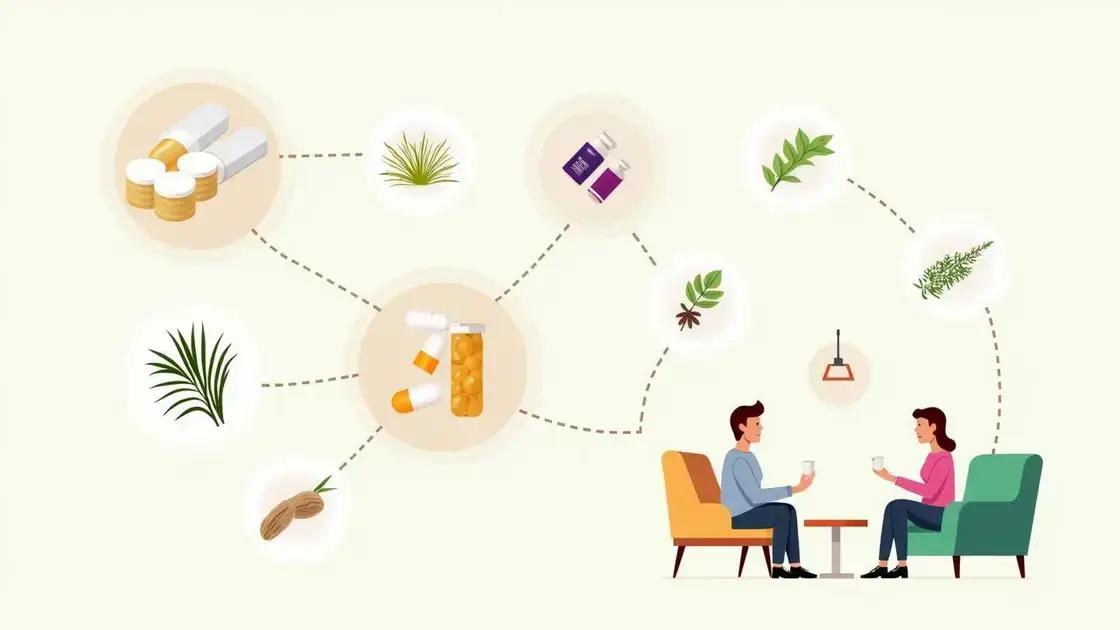Reducing alcohol consumption can significantly improve erectile dysfunction by enhancing blood flow, increasing libido, and promoting overall sexual health. Alternative treatments, including oral medications, therapy, and lifestyle changes, can further support recovery and overall well-being. Consulting healthcare professionals is essential for effective treatment options.
Can erectile dysfunction improve with reduced alcohol consumption? Alcohol affects sexual health, and many men are seeking solutions for ED. In this article, we’ll delve into how cutting down on alcohol can enhance your overall well-being and possibly improve erectile function. We’ll explore the mechanisms behind erectile dysfunction, the negative impacts alcohol has on performance, and provide practical tips for reducing alcohol intake. Understanding these factors is crucial for anyone looking to regain their confidence and health.
Understanding Erectile Dysfunction

Erectile dysfunction (ED) is a condition where a man has difficulty achieving or maintaining an erection during sexual activity. It is more common than many realize, affecting millions of men worldwide. Understanding the causes and implications of ED is vital for addressing the issue effectively.
Common Causes of Erectile Dysfunction
There are various factors that can contribute to erectile dysfunction, including:
- Physical health issues: Conditions such as diabetes, hypertension, and obesity can impair blood flow and nerve function.
- Psychological factors: Stress, anxiety, and depression can significantly impact sexual performance.
- Hormonal imbalances: Low testosterone levels can affect libido and erections.
- Lifestyle choices: Factors like smoking, excessive alcohol consumption, and lack of exercise also play a crucial role.
Symptoms of Erectile Dysfunction
The primary symptom of erectile dysfunction is the inability to achieve or maintain an erection suitable for sexual intercourse. Other symptoms may include:
- Reduced sexual desire
- Difficulty in achieving an erection
- Decreased pleasure during sexual activity
When to Seek Help
If ED issues persist, it’s essential to consult a healthcare professional. It’s important to rule out any underlying health conditions that may be contributing to the problem. Early intervention can lead to more effective treatment options.
Understanding erectile dysfunction and its causes is the first step towards finding the best solutions. In the following sections, we will explore the impact of alcohol on sexual health and how reducing alcohol consumption may improve ED symptoms.
The Impact of Alcohol on Sexual Health

The impact of alcohol on sexual health is significant and multifaceted. While many believe that alcohol can enhance sexual experiences, excessive consumption may lead to the opposite effect, particularly in men. Understanding these effects is essential, especially for those concerned about erectile dysfunction (ED).
How Alcohol Affects Erections
Alcohol is a depressant that can affect the central nervous system, leading to:
- Reduced Blood Flow: Alcohol can impede blood flow to the penis, making it harder to achieve an erection.
- Hormonal Changes: Increased alcohol consumption can alter hormone levels, including testosterone, which is crucial for a healthy sex drive.
- Neurological Effects: Alcohol may interfere with the nerve signals that are necessary for an erection.
Short-Term vs. Long-Term Effects
In small amounts, alcohol might lower inhibitions and enhance sexual pleasure. However, long-term excessive use can lead to:
- Chronic Erectile Dysfunction: Regular heavy drinking can result in persistent ED.
- Decreased Libido: Prolonged alcohol abuse can diminish libido and sexual arousal.
Social and Psychological Factors
Consuming alcohol can create a cycle of dependency. People may use alcohol to cope with anxiety related to sexual performance, which can lead to:
- Increased Anxiety: Worrying about sexual performance while under the influence can decrease confidence and worsen ED.
- Social Pressure: The culture surrounding drinking and sexuality can perpetuate harmful habits that negatively impact sexual health.
Understanding Your Limits
For those experiencing ED, it’s crucial to examine your alcohol consumption. Reducing intake can improve sexual health and overall well-being. Understanding the impact of alcohol is a vital step in addressing any concerns regarding erectile dysfunction.
Benefits of Reducing Alcohol Consumption

Reducing alcohol consumption has numerous benefits for both physical and mental health. For men dealing with erectile dysfunction (ED), cutting back on alcohol can significantly improve overall well-being.
Improved Sexual Function
One of the most immediate benefits of reducing alcohol is enhanced sexual performance. Fewer drinks can lead to:
- Better Erections: Reduced alcohol intake can improve blood flow and nerve response, making it easier to achieve and maintain an erection.
- Increased Libido: Lower alcohol consumption can lead to higher testosterone levels, which can boost sexual desire.
Enhanced Overall Health
Limiting alcohol intake can have a positive impact on overall health:
- Weight Management: Alcohol is high in calories. Reducing consumption can aid in weight loss and improved body image.
- Better Sleep: Alcohol can disrupt sleep patterns. Improved sleep quality can enhance mood and energy levels.
Mental Clarity and Mood Stability
Cutting back on alcohol can contribute to improved mental health:
- Reduced Anxiety: Lower alcohol levels can lead to decreased anxiety and avoidance behaviors related to sexual performance.
- Enhanced Focus: A clear mind can help in making better choices regarding personal health and relationships.
Stronger Relationships
Reducing alcohol can lead to healthier, more meaningful connections:
- Improved Communication: Less alcohol can lead to clearer communication with partners, essential for building intimacy.
- Increased Quality Time: Enjoying activities without alcohol can help couples bond and create strong memories.
Long-Term Health Benefits
In the long run, reducing alcohol consumption can lower the risk of serious health issues:
- Decreased Risk of Chronic Conditions: Reduced consumption can minimize the risk of heart disease, liver disease, and some types of cancer.
- Better Life Satisfaction: Many individuals find that less alcohol leads to a more fulfilling lifestyle.
Tips for Reducing Alcohol Intake

Reducing alcohol intake is an important step for improving both physical and mental health. Here are some practical tips to help you cut back on alcohol:
Set Clear Goals
Start by determining how much you want to reduce your alcohol consumption. Write down specific goals, such as:
- Drinking less frequently: Aim for a certain number of alcohol-free days each week.
- Limiting servings: Decide on a maximum number of drinks for each occasion.
Find Alternatives
Replace alcoholic drinks with healthier options. Consider:
- Sparking Water: Add fruit slices for flavor without alcohol.
- Mocktails: Create fun non-alcoholic cocktails using juice and herbs.
Practice Mindful Drinking
Be aware of your drinking habits. To practice mindfulness:
- Savor your drink: Take small sips and enjoy the flavors.
- Reflect on feelings: Notice how alcohol affects your mood and energy levels.
Create a Support System
Share your goals with friends and family. Support can help you:
- Stay accountable: Partners can remind you of your goals.
- Encourage alternatives: Engage in activities that don’t revolve around drinking.
Engage in Healthy Activities
Replace the time spent drinking with healthier pursuits. Consider:
- Exercise: Join a gym or sports club to stay active and meet new people.
- New Hobbies: Explore interests like cooking, painting, or reading that keep your mind occupied.
Exploring Alternative Treatments for ED

Exploring alternative treatments for erectile dysfunction (ED) can provide various options for those seeking to improve their sexual health. Understanding these alternatives is essential, particularly for individuals looking to minimize their alcohol intake.
Oral Medications
Many men find relief with oral medications. These include:
- Sildenafil (Viagra): This medication increases blood flow to the penis, helping achieve an erection.
- Tadalafil (Cialis): Known for its longer-lasting effects, it allows more spontaneity in sexual activity.
Therapy and Counseling
Sexual therapy can address psychological factors contributing to ED. Benefits include:
- Addressing Anxiety: Professional help can reduce performance anxiety and improve sexual confidence.
- Enhancing Communication: Counseling can strengthen relationships by improving communication between partners.
Lifestyle Changes
Incorporating healthy habits can create significant improvements:
- Regular Exercise: Physical activity enhances blood flow and can increase libido.
- Healthy Diet: A balanced diet supports overall health, influencing ED positively.
Natural Remedies
Some men explore natural options such as:
- Herbal Supplements: Ginseng and L-arginine are among supplements that may support erectile function.
- Acupuncture: Some studies suggest acupuncture might help improve sexual function by reducing stress.
Devices and Surgical Options
For certain cases, medical devices or surgery might be considered:
- Pumps: Vacuum erection devices can help create an erection by enhancing blood flow.
- Pensile Implants: Surgical options involve placing devices that allow for an erection when desired.
Before starting any treatment, it’s essential to consult a healthcare provider to discuss options, benefits, and potential side effects.
Improving Sexual Health Through Lifestyle Changes
Reducing alcohol consumption has a remarkable impact on erectile dysfunction and overall sexual health. By understanding the effects of alcohol and its role in ED, individuals can begin to make informed choices that benefit their well-being.
Exploring alternative treatments, ranging from medications to lifestyle changes and natural remedies, can provide additional avenues for restoring sexual function. Engaging in healthier habits, seeking professional support, and considering various therapies can lead to significant improvements.
Ultimately, an integrated approach that combines reduced alcohol intake with alternative treatments can pave the way to a fulfilling sexual life. Regular consultations with healthcare professionals can ensure safe and effective solutions tailored to individual needs.
FAQ – Frequently Asked Questions about Erectile Dysfunction and Alcohol
Can reducing alcohol consumption improve erectile dysfunction?
Yes, studies suggest that cutting back on alcohol can lead to better erectile function and overall sexual health.
What are some alternative treatments for erectile dysfunction?
Alternative treatments include oral medications, therapy, lifestyle changes, natural remedies, and medical devices.
How does alcohol affect sexual health?
Alcohol can impair blood flow and nerve signals, leading to difficulties in achieving or maintaining an erection.
What lifestyle changes can help with erectile dysfunction?
Regular exercise, a healthy diet, and reducing stress can all contribute to better sexual health.
Is it important to seek professional help for ED?
Yes, consulting a healthcare provider is essential to identify the underlying causes and appropriate treatment options.
Are there natural remedies for ED?
Some natural remedies include herbal supplements like ginseng and lifestyle changes such as exercise and diet modifications.













